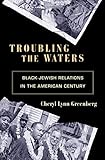Troubling the Waters : Black-Jewish Relations in the American Century / Cheryl Lynn Greenberg.
Material type: TextSeries: Politics and Society in Modern America ; 68Publisher: Princeton, NJ : Princeton University Press, [2010]Copyright date: ©2006Edition: Course BookDescription: 1 online resource : 1 halftoneContent type:
TextSeries: Politics and Society in Modern America ; 68Publisher: Princeton, NJ : Princeton University Press, [2010]Copyright date: ©2006Edition: Course BookDescription: 1 online resource : 1 halftoneContent type: - 9780691146164
- 9781400827077
- online - DeGruyter
- Issued also in print.
| Item type | Current library | Call number | URL | Status | Notes | Barcode | |
|---|---|---|---|---|---|---|---|
 eBook
eBook
|
Biblioteca "Angelicum" Pont. Univ. S.Tommaso d'Aquino Nuvola online | online - DeGruyter (Browse shelf(Opens below)) | Online access | Not for loan (Accesso limitato) | Accesso per gli utenti autorizzati / Access for authorized users | (dgr)9781400827077 |
Browsing Biblioteca "Angelicum" Pont. Univ. S.Tommaso d'Aquino shelves, Shelving location: Nuvola online Close shelf browser (Hides shelf browser)

|

|

|

|

|

|

|
||
| online - DeGruyter The Judge in a Democracy / | online - DeGruyter Enough to Say It's Far : Selected Poems of Pak Chaesam / | online - DeGruyter Cunning / | online - DeGruyter Troubling the Waters : Black-Jewish Relations in the American Century / | online - DeGruyter Women at the Beginning : Origin Myths from the Amazons to the Virgin Mary / | online - DeGruyter Philosophy as a Humanistic Discipline / | online - DeGruyter The Sense of the Past : Essays in the History of Philosophy / |
Frontmatter -- Contents -- Acknowledgments -- Introduction -- Chapter One. Settling In -- Chapter Two. Of Our Economic Strivings -- Chapter Three. Wars and Rumors of Wars -- Chapter Four. And Why Not Every Man? -- Chapter Five. Red Menace -- Chapter Six. Things Fall Apart -- Abbreviations -- Notes -- Index -- Backmatter
restricted access online access with authorization star
http://purl.org/coar/access_right/c_16ec
Was there ever really a black-Jewish alliance in twentieth-century America? And if there was, what happened to it? In Troubling the Waters, Cheryl Greenberg answers these questions more definitively than they have ever been answered before, drawing the richest portrait yet of what was less an alliance than a tumultuous political engagement--but one that energized the civil rights revolution, shaped the agenda of liberalism, and affected the course of American politics as a whole. Drawing on extensive new research in the archives of organizations such as the NAACP and the Anti-Defamation League, Greenberg shows that a special black-Jewish political relationship did indeed exist, especially from the 1940s to the mid-1960s--its so-called "golden era"--and that this engagement galvanized and broadened the civil rights movement. But even during this heyday, she demonstrates, the black-Jewish relationship was anything but inevitable or untroubled. Rather, cooperation and conflict coexisted throughout, with tensions caused by economic clashes, ideological disagreements, Jewish racism, and black anti-Semitism, as well as differences in class and the intensity of discrimination faced by each group. These tensions make the rise of the relationship all the more surprising--and its decline easier to understand. Tracing the growth, peak, and deterioration of black-Jewish engagement over the course of the twentieth century, Greenberg shows that the history of this relationship is very much the history of American liberalism--neither as golden in its best years nor as absolute in its collapse as commonly thought.
Issued also in print.
Mode of access: Internet via World Wide Web.
In English.
Description based on online resource; title from PDF title page (publisher's Web site, viewed 08. Jul 2019)


